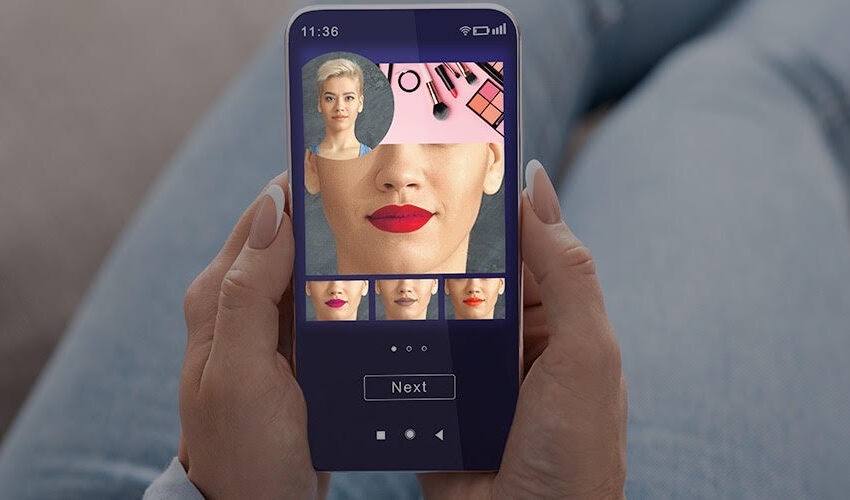Beauty ECommmerce: Virtual Try-On
Beauty ECommerce Success
Ecommerce and the beauty industry are growing respectively. Combined, the beauty ecommerce market is a powerful force, forecasted to exceed 716B USD by 2025. Shopping online continues to become the norm for us, and the online beauty market is no exception. From Xiaohongshu to Ulta, there are various successful beauty ecommerce sites that have completely transformed the ways consumers purchase beauty products. Recent strategies have proven that using beauty influencers, having monthly subscriptions and leveraging microtrends contributes to the success of beauty ecommerce retailers because of the personal connection it creates with customers. More recently, using augmented reality (AR) to try-on makeup from the comfort of one’s home has become the trend that makes beauty retailers stand out from the rest. Let’s look at why this trend is proving to be the most important one out there for beauty ecommerce success.
What is Virtual Try-On?
Before we were hit with the COVID-19 pandemic, buying beauty products in-store made the most sense, particularly when it came to makeup color-matching, for example. The pandemic forced beauty gurus and everyday makeup consumers alike to have to shop for beauty products strictly online. For those who already had their tried and true products memorized, this was an adaptable experience. However, with notable beauty brands continuing to release products, how would customers be certain that the new shade of blush complimented their skin tone without being able to try it on?
This is the problem virtual try-on quickly solved. Virtual try-on uses AR technology to allow a potential customer to try-on a beauty product (i.e. makeup) by using a camera-enabled smart device (e.g. smartphone). It makes sense why virtual try-on has become successful recently. Not only did the pandemic force consumers to adapt to this option, but common, trendy AR filters on social media apps (e.g. Snapchat, Instagram) have become ingrained in our digital lives, aiding in a seamless transition into virtually trying-on products before purchasing. Also, with retailers exponentially committing to digital transformation for their customer experiences, it makes sense that the beauty ecommerce industry has leaned into using AR technology for virtual try-on.
Virtual try-on for beauty products has numerous benefits for the customer. They can try on a product at any time of the day, instead of having to wait for a store to open or make sure to get to a store before they close. Customers can also try the product on themselves, virtually, from anywhere, including the comfort of their home. This means not needing to spend gas to drive to a store, not having to squeeze in time in a busy schedule to head over to a store, and not having to experience the dread of a store not having your specific product in stock. Virtual try-on also promotes a very collaborative experience, customers who use a virtual-try-on feature can send a picture of what they’d look like with a specific product, and send the picture to friends, asking for feedback and opinions on the product.
When beauty brands consider virtual try-on for their products, it is important that they keep inclusion at the forefront of the implementation process. As with in-person retail experiences, folks with darker complexions are often excluded from trying on beauty products because there aren’t products that match their skin tone. With virtual try-on, brands must not only ensure that there are options to virtually try-on products that will match well on every skin tone, but also must guarantee that the AI that provides the AR experience itself is not biased in favor of lighter complexions. We’re talking about even before the customer gets to virtually try-on the products, will the AI on the mobile app, for example, recognize their face depending on their skin color? This needs to be addressed early on. AI isn’t inherently biased, but unfortunately, humans that program the AI may unintentionally train the AI to favor one specific identity group over others. For this specific AR experience, it is crucial for beauty brands to consider inclusion efforts in their virtual try-on development. Popular beauty brands like Fenty Beauty and Sephora are already doing this. In conjunction with new AR capabilities, these brands are ensuring that their virtual try-on features are inclusive to all customers.
Startups for Beauty Virtual Try-On
In order for beauty brands to begin incorporating virtual try-on for their customer experience strategies, they must partner with startups that are creating the AR software needed for this experience. At Iterate.ai, we believe in startups because they are the leaders in innovation. Big brands, like those in the beauty industry, can benefit from the services and technologies that startups offer. Our Signals platform has tracked over 15.8 million startups so that you can find a company that fits your needs. Using Signals, let’s take a look at 5 startups that we’ve indexed that have provided virtual try-on for the beauty industry.
- Perfect Corp.
Perfect Corp. is a Taiwanese startup that has partnered with beauty brand giants like MAC Cosmetics and L’Oréal to offer a variety of AR technologies. Notably, their patented AgileFace® is a face tracking technology that offers a very accurate virtual try-on makeup experience for customers. AgileFace® is designed for all brands including small and upcoming businesses to large beauty brands. Perfect Corp. uses deep learning technology to promise a 20% increase in AR overlay accuracy and a 200% performance improvement. This startup also guarantees their technology to be universal, providing a personalized virtual try-on experience for all genders, ages, and ethnic backgrounds. - PulpoAR
San Francisco based startup, PulpoAR, is ready to reinvent the customer experience with their AR commerce capabilities. PulpoAR classifies their services as omnichannel virtual try-on solutions for beauty retail. Sephora and MAC Cosmetics are examples of customers that PulpoAR partners with to provide the best virtual try-on experiences. PulpoAR knows that virtual try-on helps decrease online check-out drop rate by up to 30%, and their AR technology offers real-time try-on for mobile apps, desktop, smart mirrors, and even social media. - ModiFace
ModiFace is a Canadian startup that prides itself on creating augmented reality tech for beauty brands like L’Oréal. This startup has even offered virtual try-on capabilities to Instagram to optimize the shopping experience for users. ModiFace’s patented AR SDK features make it possible to try-on beauty products on live video and track facial features with accuracy. Their technology is functional on AR mobile apps, AR websites, and in-store magic mirrors. With over 14 years of experience in the AR beauty market and over 50 registered patents, ModiFace has served more than a billion users with its virtual try-on technology. - ShiShi Beauty
Chinese startup, ShiShi Beauty, offers a mobile beauty mirror for users to virtually try-on makeup in real-time. This startup promises a fun and safe platform for brands to offer their customers a COVID-friendly alternative to traditional in-store makeup try-on experiences. ShiShi Beauty acknowledges the need for an inclusive try-on experience by accurately supporting multi-shade products, and their software allows users to try on multiple products from different categories simultaneously. Their clearly defined API integrates into clients’ applications seamlessly and their Web-based CMS makes it easier for clients to incorporate ShiShi Beauty’s software into existing sites. - QuyTech
QuyTech is an Indian startup that focuses on delivering exceptional mobile app solutions to a variety of startups and enterprises. AR is one of their specialities and they have created a virtual try-on app for makeup that any client can integrate into existing software. QuyTech knows that brands that have virtual try-on capabilities have less returns or replacement orders since customers have seen the product on themselves before purchasing. This startup is confident that their virtual-try on app will boost clients’ sales, user engagement and customer satisfaction.
Future of Beauty ECommerce
As a Business Tool
Virtual try-on is here to stay as it has proven to boost conversion rates, increase order sizes, and improve customer satisfaction. The future of beauty ecommerce is only getting brighter, thanks to digital transformation. Technologies, like AR, have permanently changed the beauty industry. Not only does AR support virtual try-on experiences, it is also a clever marketing tool that beauty brands can use to attract more traffic onto their sites and apps. Consumers have made it clear that they want AR experiences; 61% of consumers actually prefer to shop with retailers who offer AR experiences– something brands should start listening to if they haven’t already.
Metaverse and NFTs
The future of beauty ecommerce also lies with the development of the metaverse. Yes, makeup looks and trends will absolutely matter in the metaverse. With beauty tech companies creating wearable NFTs and virtual makeup looks, we recommend keeping a lookout for how this will play out in the metaverse. Two startups we mentioned earlier, Perfect Corp. and PulpoAR, are already developing metaverse and NFT experiences because prominent beauty brands know that this is the direction the industry is heading towards. PulpoAR’s MetaBeauty metaverse AR app is predicted to become one of the main sales channels for purchasing virtual beauty looks and products. Similarly, Perfect Corp. has introduced their line of wearable NFTs by launching four virtual makeup looks on OpenSea, an NFT platform. Users can virtually try-on these futuristic makeup looks before purchasing, and the looks themselves can only be accessed on Perfect Corp.’s YouCam app.
Need some guidance before committing to a virtual try-on experience for your company? Want a team of experts to support your brand’s entrance into the metaverse? Looking to be partnered with a startup that can provide the digital solutions you are looking for? We can help. Please connect with us here to make your innovation visions a reality.

